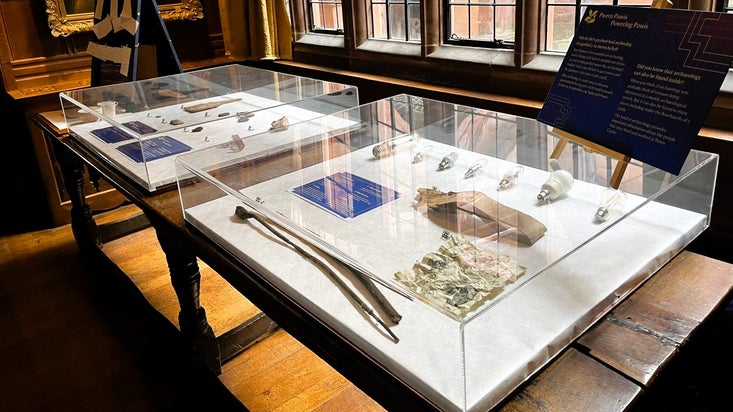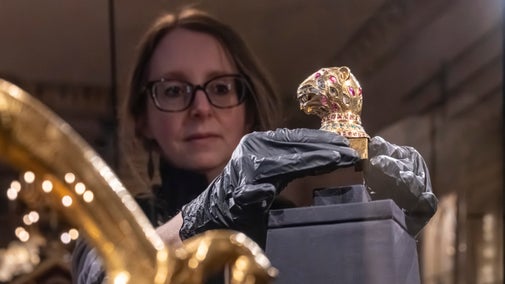
Become a member
Join today and help protect nature, beauty and history – for everyone, for ever. Enjoy access to more than 500 places with National Trust membership.
Medieval castle rising dramatically above the celebrated garden
Welshpool, Powys, SY21 8RF

| M | T | W | T | F | S | S |
|---|---|---|---|---|---|---|
Open
Closed
| Asset | Opening time |
|---|---|
| Castle | Castell | 11:00 - 15:30 |
| Clive Museum | Amgueddfa Clive | 11:00 - 15:30 |
| Garden | Gardd | 10:00 - 16:00 |
| Garden coffee shop | Siop Goffi’r Ardd | Closed |
| Courtyard Café | Caffi’r Cwrt | 10:00 - 16:00 |
| Shop | Siop | 11:00 - 16:00 |
Please be aware that the castle and shop are open on weekends only until the 14 February. The last ticket sold to the castle is 2.50pm to ensure visitors have enough time to walk up to the castle. Last entry through the castle door at 3.00pm.
| Ticket type | With Gift Aid | Without Gift Aid |
|---|---|---|
| Adult (18+) | £18.70 | £17.00 |
| Child (5-17) under 5s free | £9.40 | £8.50 |
| Family (2 Adults and up to 3 children) | £46.80 | £42.50 |
| 1 adult plus 2 or 3 children | £28.10 | £25.50 |
| Group (Adult 18+) | £16.15 | |
| Group (Child 5-17) | £8.08 |
| Ticket type | With Gift Aid | Without Gift Aid |
|---|---|---|
| Adult (18+) | £13.20 | £12.00 |
| Child (5-17) under 5s free | £6.60 | £6.00 |
| Family (2 Adults and up to 3 children) | £33.00 | £30.00 |
| 1 adult and 2 or 3 children | £19.80 | £18.00 |
| Ticket type | With Gift Aid | Without Gift Aid |
|---|---|---|
| Adult (18+) | £19.80 | £18.00 |
| Child (5-17) under 5s free | £9.90 | £9.00 |
| Family (2 Adults and up to 3 children) | £49.50 | £45.00 |
| 1 adult and 2 or 3 children | £29.70 | £27.00 |
| Group (Adult 18+) | £17.10 | |
| Group (Child 5-17) | £8.55 |
| Ticket type | With Gift Aid | Without Gift Aid |
|---|---|---|
| Adult (18+) | £14.30 | £13.00 |
| Child (5-17) under 5s free | £7.20 | £6.50 |
| Family (2 Adults and up to 3 children) | £35.80 | £32.50 |
| 1 adult plus 2 or 3 children | £23.10 | £19.50 |
Siop lyfrau ail-law. Croesewir rhoddion. | Second-hand bookshop. Donations welcome.
Caffi’r Cwrt ar agor bob dydd. | Courtyard Café open daily.
Parcio am ddim. | Free to park. If you wish to park in town and walk up through the estate, there is a pay and display car park on Berriew Street run by Powys County Council | Os ydych yn dymuno parcio yn y dref a cherdded i fyny drwy’r stad, mae maes parcio talu ac arddangos ar Stryd Berriew, dan ofal Cyngor Sir Powys.
Car park - more informationSiop Goffi’r Ardd wedi'i lleoli yn yr Ardd Ffurfiol. Ar agor Ebrill i Medi. | Garden Coffee Shop located in the Formal Garden. Open April to September.
Caniateir cŵn yn yr ardd rhwng 1 Tachwedd a 28 Chwefror. Cŵn cymorth trwy gydol y flwyddyn. | Dogs allowed in the garden 1 November to 28 February. Assistance dogs all year round.
Dau wedi eu lleoli yn y maes parcio ger y Caban Croeso. Am ddim i'w defnyddio. | Two located in the car park by the Welcome Cabin. Free to use.
Toiledau y tu allan i fynedfa'r ardd ac yn yr Ardd Ffurfiol. Cyfleusterau newid babanod ar gael. | Toilets outside the garden entrance and in the Formal Garden. Baby changing facilities available.
Booking is not required in advance to visit the castle or exhibitions during opening hours. Blue Badge parking and drop-off point. Accessible toilets. Step-free route around garden, steep slopes and unfenced terraces. No step-free access to castle and Clive Museum.
Toiled hygyrch y tu allan i fynedfa'r ardd ac yn yr Ardd Ffurfiol. | Accessible toilet outside the garden entrance and in the Formal Garden.
Amrywiaeth o arwynebeddau anwastad fel graean, coblau, elltydd a llwybrau garw. Cwympiadau agored ar y terasau, rhaid goruchwylio plant. | Variety of uneven surfaces such as gravel, cobbles, rough paths and slopes. Unguarded drops on terraces, children must be supervised.
Front entrance - what3words: ///duplicate.bowls.winks
Powis Castle and Garden is a one pawprint rated place. Find out more about bringing your dog to Powis Castle and Garden. Take in a view of the castle with a drink and bite to eat and your four-legged friend by your side. Explore the garden 1 November - 28 February.

Take a look at the map of Powis Castle and Garden to help plan your visit.
Sweet wrappers, newspaper clippings and a comb believed to be more than 60 years old have been found hidden under the floorboards of Powis Castle and Garden, the famous 13th century castle near Welshpool, cared for by National Trust Cymru.

Medieval castle built by Welsh princes. Remodelled over centuries into the grand home of the Herbert family.
Grade I listed garden including 17th century Italianate terraces with gigantic clipped yews, and an Edwardian Formal Garden.
One of the UK's most significant collections of South Asian artefacts, dating from about 1600 to the 1830s.
Courtyard Café serving lunches, light bites, snacks and cakes. Garden Coffee Shop offering snacks, cakes and ice cream.
Courtyard Shop selling souvenirs, local products and National Trust favourites. Garden Shop with plant sales. Second-hand bookshop.
Whether you’re visiting with children or grandchildren, there’s plenty to keep the whole family entertained at Powis Castle and Garden.

Dating back 300 years, explore a world-class garden steeped in history. Experience dramatic terraces, flower borders, fantastical topiary and superb views.

Every inch of Powis Castle is decorated with intricate, beautiful detail. As you wander through the castle’s state rooms, you’ll be taken on a journey of eras gone by. From Elizabethan through to Edwardian, be sure to stop and pause in each room to take it all in.

Visit the castle and discover more about the global collections at Powis, including statues, furniture and textiles from Europe, India and East Asia.

The Clive Museum features more than 300 items from India and the Far East in the largest private collection of its type in the UK. Find out more about its history.

This February half term, power up your family adventure with hands-on activities, trails, and playful challenges, all celebrating an exciting new chapter for this historic site.

Explore the layers of history within the garden at Powis Castle on this easy walking trail. You'll stroll along Italianate terraces, around the formal garden and through the Wilderness woodland, before rewarding yourself with a nice cup of tea.

After exploring the castle or traversing the terraces, refuel with a tasty treat from our Courtyard Café or take home a gift from the shop to help you remember a great day out.


This gorgeous half-timbered cottage in the stunning Powis Castle gardens has gorgeous Edwardian interiors.
This February half term, power up your family adventure with hands-on activities, trails, and playful challenges, all celebrating an exciting new chapter for this historic site.
Celebrate St David’s Day with a fun-filled family adventure at Powis Castle.
Join one of our volunteer photographers in the garden to learn something new, meet new people and enjoy being in the great outdoors.
This spring, treat the whole family to a world of adventure at Powis Castle and Garden on an Easter trail.
Built in the 13th century as a medieval fortress, the castle and garden you see today reflects the changing ambitions and visions of the Herbert family, who occupied the castle from the 1570s.
Furnished with decorative fabrics, world-class paintings, furniture, tapestries, and the unique Clive Collection of South Asian objects, the interior reflects the Elizabethan period through to the Edwardian period.
With views across the Severn Valley, the world-famous garden retains many of its original features including 17th century Italianate terraces lined with vibrant herbaceous borders and 30ft clipped yew trees, an Edwardian formal garden with century-old apple trees and rose beds, and a peaceful woodland area.
A specialist team will remove panelling from the walls to survey electrical wiring, whilst also recording any historical or architectural finds along the way.
Find out how we keep our famous yew ‘tumps’ and hedges in shape with extreme gardening, at Powis Castle in Wales.

From tapestries and tables, paintings and porcelain, to flooring and furniture, every inch of the 13th century castle is protected and preserved for future generations to enjoy.

Powis is a Welsh castle built by a Welsh prince, Gruffudd ap Gwenwynwyn (c1252). It survived wars and division to become one of the most prominent castles in Wales.

Discover a paradise garden in Wales, with 300 hundred years of garden transformation providing many layers of history to explore.

Visit the castle and discover more about the global collections at Powis, including statues, furniture and textiles from Europe, India and East Asia.

The Clive Museum features more than 300 items from India and the Far East in the largest private collection of its type in the UK. Find out more about its history.

Looking for a great way to spend your spare time, meet new people, and make a difference? Find out more about volunteering opportunities at Powis Castle in Wales.

Visitors to Powis Castle and Garden from the 14 February can now access globally significant items closer than ever before. Thanks to funding from the Welsh Government’s Cultural Transformational Capital Programme, a grant of just over £60,000 has enabled important historical objects to take a more prominent place within the museum’s gallery.

Senior Gardener Dan Bull will spend several weeks meticulously pruning the hedges - some as tall as 55ft - using a cherry picker and powered shears. The job covers over 15,000 square meters of formal hedging, a defining feature of the Baroque-style gardens since the 18th century.

Visitors have a rare chance to see six precious 2,000 year old Etruscan vases as they get a once in a decade deep clean at Powis Castle and Gardens.

Could buy two packs of annual flower seed to embellish the rose beds or a hog hair brush for dusting furniture, ceramics and plaster.

Join today and help protect nature, beauty and history – for everyone, for ever. Enjoy access to more than 500 places with National Trust membership.
By sharing your email address you’re agreeing to receive marketing emails from the National Trust and confirm you’re 18 years old or over. Please see our for more information on how we look after your personal data.